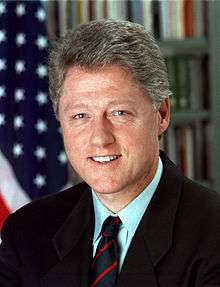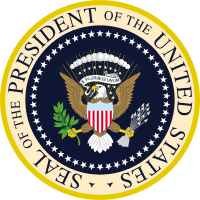1996 State of the Union Address
The 1996 State of the Union address was given by President Bill Clinton to a joint session of the 104th United States Congress on January 23, 1996. The speech was the last State of the Union address of President Clinton's first term. This speech occurred shortly after the federal government shutdown of 1995 and 1996 which had resulted from disagreements on the 1996 United States federal budget.
President Clinton discussed the economy and declared that "the era of big government is over," and continued, "but we cannot go back to the time when our citizens were left to fend for themselves. We must go forward as one America, one nation working together, to meet the challenges we face together. Self-reliance and teamwork are not opposing virtues -- we must have both."[1] The president discussed welfare reform, the V-chip, education, community policing, crime and the environment. The president also discussed foreign relations and the federal budget.
The Republican Party response was delivered by Senator Bob Dole of Kansas. He stated that "[President Clinton] is the chief obstacle to a balanced budget and the balanced budget amendment.... While the President's words speak of change, his deeds are a contradiction. President Clinton claims to embrace the future while clinging to the policies of the past."[1][2]
Donna Shalala, the Secretary of Health and Human Services, served as the designated survivor.[3]
References
- 1 2 Mitchell, Alison (24 January 1996). "Clinton Offers Challenge To Nation, Declaring 'The Era of Big Government is Over'". The New York Times. Retrieved 23 December 2011.
- ↑ http://www.pbs.org/newshour/bb/congress/republican_response.html
- ↑ USA Today, Page A12. Feb 5, 1997
External links
- (full transcript), The American Presidency Project, UC Santa Barbara.
- 1996 State of the Union Address (video) at C-SPAN
| Preceded by 1995 State of the Union Address |
State of the Union addresses 1996 |
Succeeded by 1997 State of the Union Address |

